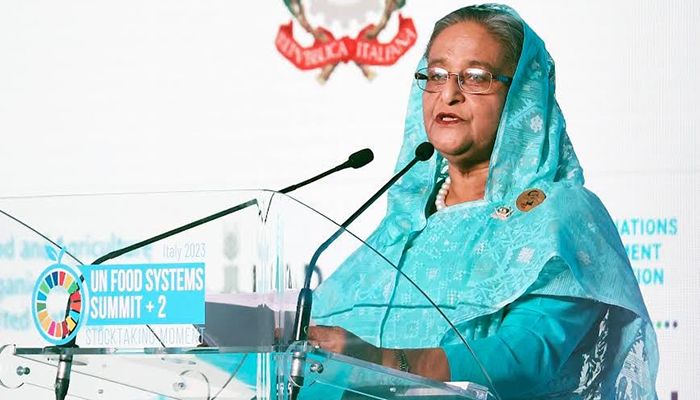
Desk Report
Publish: 25 Jul 2023, 10:57 am

Prime Minister Sheikh Hasina || Photo: Collected
At the UN Food Systems Summit today, Prime Minister Sheikh Hasina presented a five-point plan with a focus on concerted action to remove export restrictions on food and fertilizer, with the goal of ensuring a sustainable, secure, and nutrient-rich food system for everyone.
She also emphasized the necessity of encouraging private business owners and multilateral development banks to invest in modern agriculture.
The prime minister offered these suggestions while speaking at the Food and Agriculture Organization (FAO) headquarters at the UN Food Systems Summit+2 Stocktaking Moment (UNFSS+2).
The summit began this evening with the theme of "Sustainable Food Systems for People, Planet and Prosperity: Diverse Pathways in a Shared Journey".
It needs to provide financial incentives and policy support at the international level to encourage multilateral development banks and private entrepreneurs to invest in modern agriculture," Sheikh Hasina said raising her first proposal.
In her second suggestion, she stated that taking coordinated action was critically necessary to eliminate any trade barriers, including easing export limits on food and fertilizer in addition to maintaining the efficacy of the UN Secretary General's Black Sea Grain Deal.
The final suggestion she made was that the international community should step up and form global and regional "food banks" to help with emergencies and assist underdeveloped nations in changing their food production methods in light of the effects of climate change.
Nano-technology, bio-informatics and advanced agricultural technologies developed keeping the pace with the 4th industrial revolution in agricultural education and research should be made available to all, said the premier in her fourth proposal.
Making her final proposal, she said it needs to develop a massive social movement involving young people to prevent the waste of about one-third of the food produced worldwide every year.
"If we can collectively adopt and implement the necessary action plans, we'll be able to achieve sustainable global food security," she said.
Sheikh Hasina also asked the international community to introduce inclusive and sustainable food management for all as two billion people still remained beyond the food security net in the world.
"Food, fertilizer, energy and financial crises induced by the ongoing Ukraine war and sanctions and counter-sanctions have intensified the problem of hunger and malnutrition around the world,” she said.
The premier, however, said the cost of agriculture and food products is not the only constraint to the inability to procure nutritious food. It needs the introduction of inclusive and sustainable food management for all," she said.
The premier said some 690 million people are still suffering from malnutrition and nearly three billion are deprived of a balanced diet in the world.
Turing to Bangladesh's food sector, the premier said her government, being elected for a second term in 2009, started with a food deficit of 2.6 lakh metric tonnes and then it took various steps including providing subsidy for agricultural mechanization, opening bank account for farmers at Taka 10, ensuring a disciplined fertilizer distribution system.
"As a result, we not only achieved food self-sufficiency, but also became a food surplus country by 2013," she said.
According to a report of FAO, Bangladesh is one of top-ten food producing countries in the world. The country's production of food grains increased to 49.4 million metric tons in 2022-23 fiscal year from 32.9 million metric tons in the 2008-09 fiscal year, she said.
"Now Bangladesh ranks 3rd in rice and fish production, 2nd in jute production, 3rd in vegetable production and 6th in potato production in the world," she said.
The contribution of agriculture sector to the GDP of Bangladesh is 11.66 percent. But some 40.6 percent of the country's workforce is engaged in agriculture. The contribution of the fisheries sector to the GDP is 2.43 percent, while that of livestock sector is 1.90 percent, she added.
"Our government has attached top priority to agricultural research and innovation.... 690 improved and high-yielding crop varieties have been developed in the last 14 years. Our scientists have developed salinity-tolerant rice and they are continuing research to develop drought and waterlogging-tolerant rice," she continued.
Sheikh Hasina said her government enacted the Food Safety Act in 2013 and formed the Bangladesh Food Safety Authority in 2015.
She said now the storage capacity of food grains at the government level is about 21.59 lakh metric tons in Bangladesh. The amount of food grain stock in the country is more than 16 lakh tonnes, which was 10 lakh tonnes in 2007. Some 5 lakh family silos have been distributed in 63 upazilas under 19 disaster-prone districts of the country, she added.
The premier said Bangladesh has been expressing interest in leveraging its agricultural innovations and experiences in various parts of the world, including Africa.
A large number of audience were in the plenary room and few others halls of the FAO headquarters while Sheikh Hasina was delivering her speech. The participants supported her speech by clapping their hands.
Italian Prime Minister Giorgia Meloni, Ethiopian Prime Minister Abiy Ahmed, Nepalese Prime Minister Pushpa Kamal Dahal, Prime Minister of Samoa Fiame Naomi Mata?afa, United Nations Secretary-General António Guterres and Director General of Food and Agriculture Organization (FAO) Dr. Qu Dongyu spoke at the official opening ceremony of the summit.
Some 2,000 participants from over 160 countries, including over 20 heads of state and government are attending the UN Food Systems Summit+2 Stocktaking Moment (UNFSS+2).
Source: BSS
Subscribe Shampratik Deshkal Youtube Channel
© 2024 Shampratik Deshkal All Rights Reserved. Design & Developed By Root Soft Bangladesh